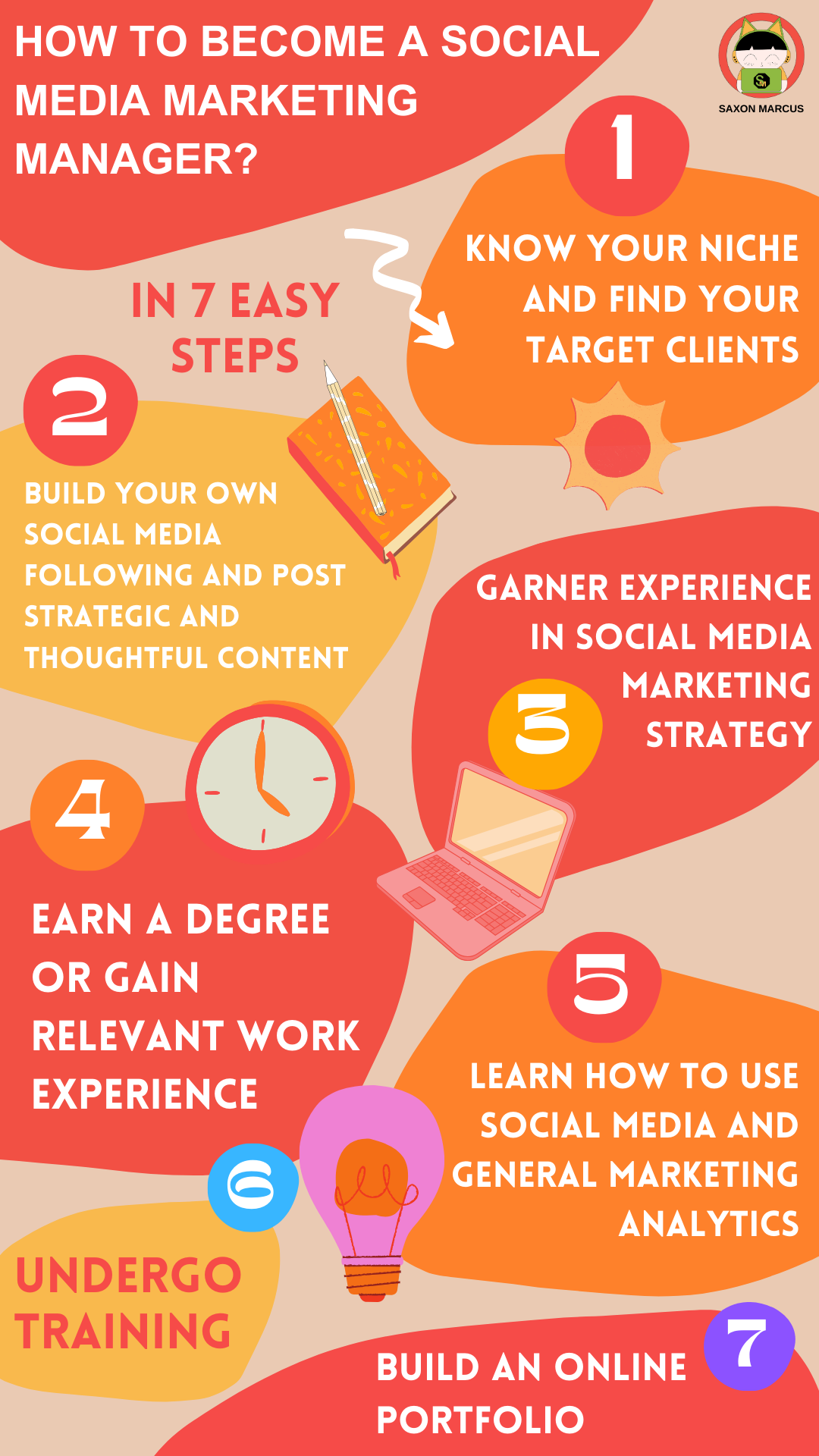A social media marketing manager is an individual who manages the social media activities of a business or person. This role has become increasingly vital because many creative marketing agencies, organizations and public figures use social media to connect with their audience or target market. To pursue this career, you must develop strong communication skills, earn a certification or relevant degree, build an online portfolio and master the use of social media.

Nowadays, social media is not only used to connect with your loved ones but also a platform to advertise products and services. That’s where a social media marketing manager comes into play. Naysayers often discount that handling social media is an easy peasy walk in the park kind of thing but it takes a lot more than just commenting, posting something and sharing images.
There’s actually a lot of data analytics and strategy behind every campaign that goes with it. You have to take in a lot of considerations such as your target market – demographics, peak hours on using social media platforms, diverse preferences and so on depending on the brand you are endorsing. In this article, we will discuss what a social media marketing manager does and how to pursue a career in this role.
WHAT DOES A SOCIAL MEDIA MARKETING MANAGER DO?
A social media marketing manager is the person or act as a social media marketing consultant within an organization’s communications, marketing or public relations department that monitors, filters, contributes to and guides the social media presence of a business, product or brand. Social media platforms are fast-paced and usually considered “real-time marketing,” so a social media marketing manager must be able to work quickly and respond and share information as it becomes available. Otherwise, they’ll be left behind and out-of-trend so to speak. The social media marketing manager often must be well-versed in news cycles and an industry expert for their company, business, product or service.
Organizations across all different industries have embraced social media as the primary method for acquiring and maintaining customers, so having someone who can manage their online presence is paramount.
Their main duties include:
- Creating editorial calendars of possible content related to timing and channel
- Publishing content to share through various social media channels. Each company may have a mix of social media channels that reach their specific market
- Responding to user-generated comments and feedback to create a positive brand experience for strong engagement
- Creating campaigns with messages that represent the brand voice
- Tracking content and campaign success through engagement ratings, metrics, and analytics
- Participating in visual design strategies
- Generating engagement and promotional strategies, such as influencer marketing, generating organic traffic and paid advertising
- Presenting findings to upper management to assess and guide strategy moving forward
- Recognizing and reassessing if a certain platform is not producing the acceptable ROI
- Maintaining brand guidelines across all channels and working with team members to ensure brand messaging is consistent
- Staying on top of trends. For example, using short videos is popular now but memes continue to see high engagement
- Contributing to the tone of the brand—be serious, responsible, or even funny if and where it makes sense
Developing and representing the brand with a consistent personality—be very clear on how this person would interact with its customers, partner brands, and/or even its competitors. For example, some fast food companies banter back and forth on Twitter with light humor and become viral with lots of engagement from customers in the sense of retweets and comments.
HOW TO BECOME A SOCIAL MEDIA MARKETING MANAGER?
The power of social media marketing comes from the unparalleled capacity of social media in three core marketing areas: connection, interaction, and customer data. To become a social media manager, follow these common steps:
Know Your Niche And Find Your Target Clients
You should know your niche or expertise. You should be passionate about it so that you’ll be invested and create content with substance. Once you identify your niche, you can now narrow down the list in which industry(ies) you want to offer your services.
Build Your Own Social Media Following And Post Strategic And Thoughtful Content
One way to show your ability to manage a social media following for a business is to generate engagement on your own. Grow your personal accounts by sharing engaging contents and increasing the number of likes, comments and shares you receive on your posts and connecting with your followers. You can also develop a content strategy for your personal profile to build this skill.
Apply social media best practices to demonstrate proof that your techniques work. Be sure to identify your own brand voice and make sure visuals—including images and graphics—match a certain look and feel. Be sure to credit photographers or other content where applicable, if you utilize images that are not your own.
Garner Experience In Social Media Marketing Strategy
There is a myth that all young people can be great at social media because they have grown up with it and they have had cameras on their phones since they were teenagers. And while yes, they are great at learning new platforms and posting for their individual following, there is a lot of strategizing and thought put into a brand’s social media platform or efforts.
If being a social media marketing manager interests you, you can garner experience by reaching out to a friend/family member that owns a small business. Get to know them and understand how or why they would want to post to social media platforms. Learn more about business objectives and how social media can enhance their businesses and even drive new customers. There are many layers to the value of social media—user-generated content, geographically relevant information, the ability for target marketing—but no business should be posting content without a strategy.
There are some sincere considerations to how each business addresses their social media and to be fair, they may change their strategy over time if one platform is not working for them. Each platform has its value and type of content, so a company or brand may need to select which ones are the best time and money investment for them.
The best way to grow in this role is to have real-world work experience so you can hone the necessary skills and be a value add to the organization.
Earn A Degree Or Gain Relevant Work Experience
Although not all social media marketing manager positions require a college degree, many employers prefer candidates to have a bachelor’s degree. The best programs for this career path include business, marketing, advertising, public relations and general communications degrees. Psychology majors also do well in this area because they are well-versed in human behaviors and the customer mindset, why we do the things we do and why we purchase items from certain brands.
You can also look for educational programs that include training and courses in social media management and strategy. Consider also pursuing internships, volunteer roles or entry-level work that involve working with social media to practice theory and strategies learned in the classroom. Massive Open Online Courses (MOOCs) can also be really helpful to gain experience and knowledge in analytics and social media campaign planning. You can find these on websites such as Udemy, Coursera and Google.
Learn How To Use Social Media And General Marketing Analytics
Every social media manager relies on analytics to determine how well campaigns and content are performing. Analytics on social media help you measure the success of what you are sharing and identify follower trends—what they like, what they don’t and what they may not respond to. The main analytics to review include followers, page views, clicks, likes, shares, comments and impressions.
While impressions are great—how many viewers see your content)—it can be helpful to understand how to translate all analytics elements into an action plan. The impressions may be great but if the engagement is low, you know that there is an opportunity to improve upon.
Many tools are available that track these metrics and show trends. As you gain hands-on experience during your education, internships and other practical roles, you can become familiar with these tools and use these insights to revise campaign and content strategies. Many small businesses and entrepreneurs utilize Google Analytics but there are also enterprise-level platforms like Core Metrics.
Reviewing analytics can often feel like reviewing comprehensive data reports and take some time to pull out and understand insights. It also takes a visual eye to know how to present these findings to senior leadership. Many people find utilizing visualization software to help present their findings.
Undergo Training
In addition to pursuing a degree, you can benefit by taking social media management training courses through several online platforms and providers. These training courses help you develop necessary research, analysis and communication skills and discover how to overcome challenges you might face when managing social media for a brand or organization.
You may also choose to take courses that will help you learn new tools, such as trending tools, content-sharing tools, publishing tools and social media platform listening tools. Due to the fast nature of social media and “real-time marketing,” it is good to understand that many companies utilize social media listening software so they are aware of what consumers are saying about them at all times. Examples include Hootsuite, HubSpot and Sprout Social.
You may not need to be well versed in using social media listening tools to land a job, but it is good to understand how this software works and how it can enhance your marketing efforts. You can also take these training courses if your previous education and experience are in a different field or if you’re interested in becoming more well-versed with social media. These courses often provide certifications that you can add to your resume and portfolio.
Build An Online Portfolio
When you interview for social media management positions, you may be asked to show your portfolio of previous social media work. Whether you pick up freelance clients, manage your personal accounts or volunteer to build a page for a non-profit organization, keeping a portfolio of top posts, engagement records and other pertinent data will ensure you have proof of your qualifications to show during interviews.
Follow Companies You Admire On All Their Channels
Follow the top brands in your industry, as well as those in other industries to become familiar with what works and what they are doing well to engage with their followers. Don’t forget to find them on all social media platforms as they may have a different purpose or messages they push out on different platforms.

WHAT SKILLS DOES A SOCIAL MEDIA MARKETING MANAGER NEED?
Some common skills necessary for social media marketing manager include:
Social Media Marketing Manager Needs To Have Good Spelling And Grammar
It is important to have excellent spelling and grammar so that the company you are representing on social media looks professional and polished.
Social Media Marketing Manager Needs To Have Skills in Proper Time Management
A social media marketing manager also needs to be able to manage their time effectively, especially those who work on a freelance basis for multiple clients. This skill ensures they publish content at the most optimal time and that the pages they manage are actively engaging with audiences.
Social Media Marketing Manager Must Have Skills In Customer Service
This skill enables a social media marketing manager to appropriately respond to comments, whether positive or negative. Strong customer service helps these professionals best represent the brand.
Social Media Marketing Manager Needs To Have Visual Eye
A lot of social media marketing managers work with graphic designers for content and digital marketing templates but some create their own. It’s important to have a visual eye for your client or company’s brand.
In this digital age where data or information can make or break a business or a person, a social media marketing manager is essential to gauge the pulse of their target audience. From this, social media marketing managers can strategize gimmicks such as meme creation, Facebook ads and the likes to increase social media presence for brand awareness.

CONCLUSION
Becoming a social media marketing manager requires a multifaceted approach involving a deep understanding of one’s niche, the cultivation of a strong social media following, practical experience in strategy development, and relevant education or work experience, ideally in business, marketing, advertising, public relations, or communications.
Alongside formal education, taking online courses, gaining proficiency in analytics tools, and staying abreast of industry trends are crucial for success in this role. Building a comprehensive online portfolio, following top brands across various industries on multiple social media channels, and honing skills such as spelling, grammar, time management, customer service, and visual aesthetics contribute to the well-rounded skill set necessary for effective social media management.
As the demand for a skilled social media marketing manager continues to rise, individuals equipped with these skills and an adaptable mindset can position themselves for success in this dynamic and vital field, where the ability to navigate and leverage the ever-evolving digital landscape is key.



